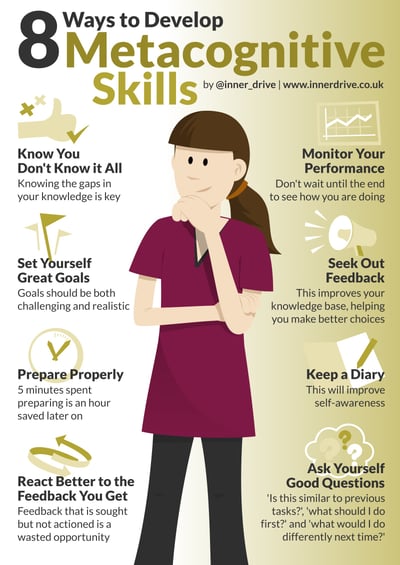Which Teacher Is Helping Third Grade Students To Develop Metacognitive Skills In Writing?
Despite its complicated sounding name, metacognition is fast becoming one of the most common topics being discussed by teachers. Research suggests that helping students develop metacognitive strategies is one of the most efficient and effective ways to help our students make additional progress. So what exactly are metacognitive skills and how do we help students develop it? The Sutton Trust explains metacognition and self-regulation approaches "aim to help learners think about their own learning more explicitly. This is usually done by teaching pupils specific strategies to set goals, and monitor and evaluate their own academic development…the intention is often to give pupils a repertoire of strategies to choose from during learning activities". Essentially, metacognition means being aware of what you are thinking about and choosing effective strategies. If you're still a bit confused, our blog 'What Is Metacognition?' may help. The Sutton Trust goes on to highlight how metacognitive strategies add, on average, up to 7 months of additional progress. But what are good metacognitive skills? In essence, what do people with high levels of metacognition do? Know What You Don't Know The United States Secretary of Defence once famously said: "Reports that say that something hasn't happened are always interesting to me, because as we know, there are known knowns; there are things we know we know. We also know there are known unknowns; that is to say we know there are some things we do not know. But there are also unknown unknowns – the ones we don't know we don't know. And if one looks throughout the history of our country and other free countries, it is the latter category that tend to be the difficult ones" What he is describing here is metacognitive knowledge which refers to how aware you are of what you do or don't know. Some people aren't very aware of gaps in their knowledge, which often leads to over-confidence (see the Dunning-Kruger effect for more on this). If you think you already know everything, it is unlikely that you will be motivated to seek out ways to improve. Set yourself great goals Goals should be both challenging and realistic. Other tips for effective goals include setting short and long term ones, focusing more on skill development and considering potential obstacles. If you know what obstacles may come your way, you will be better equipped to overcome them when the time comes. Ask Yourself Good Questions By asking yourself psychologically smart questions, you are forced to think deeply about both the task at hand and the best ways to proceed. Some examples of these questions include 'is this similar to previous tasks?', 'what should I do first?' and 'what would I do differently next time?'. For more about this strategy, check out our blog on '9 Questions to Improve Metacognition' Prepare Properly There is a story about a woodman that captures the essence and importance of preparation perfectly: A woodsman was once asked, "What would you do if you had just five minutes to chop down a tree?" He answered, "I would spend the first two and a half minutes sharpening my axe." As Alexander Pope wrote in his 1711 poem,An Essay of Criticism, 'fools rush in where angels fear to tread' - a few minutes spent in preparation can lead to hours saved later on. Monitor your performance Don't wait until the end to see how you are doing. This is a common mistake that many novices do whilst trying to complete a task. Being able to monitor your performance as you go along and 'checking in' on how you are doing is an important metacognitive skill. Seek out feedback and then use it Many people make a number of mistakes when asking for feedback. This includes leaving it to the last minute, only asking 'is this ok?' (instead of 'how can I improve this?') and asking multiple questions at once. Once you have the feedback, you have to use it. Feedback that has been sought but not actioned is a wasted opportunity. Keep a diary By keeping a diary of what you did, what you were thinking and how you felt, students will begin to build their self-awareness and develop their metacognitive skills. This may not come easy to some at first, but after a while, quickly becomes habit. Teaching students better metacognitive technique provides them with life skills that will help them get better grades. As with any skill, it requires time, patience and practice. But helping them develop metacognitive skills at each stage of a task will help. Prior to the task this involves setting goals, preparing thoroughly and thinking about similar previous situations. During the task this includes monitoring their performance and after the task seeking feedback, actioning it and keeping a diary. For more info and research on the subject, check out our guide page on how How to Improve Metacognition, or book a Metacognition Teacher CPD session. What Is Metacognition?
Metacognitive Skills

Final Thought

Which Teacher Is Helping Third Grade Students To Develop Metacognitive Skills In Writing?
Source: https://blog.innerdrive.co.uk/eight-ways-to-develop-metacognitive-skills
Posted by: princeaftek1997.blogspot.com

0 Response to "Which Teacher Is Helping Third Grade Students To Develop Metacognitive Skills In Writing?"
Post a Comment